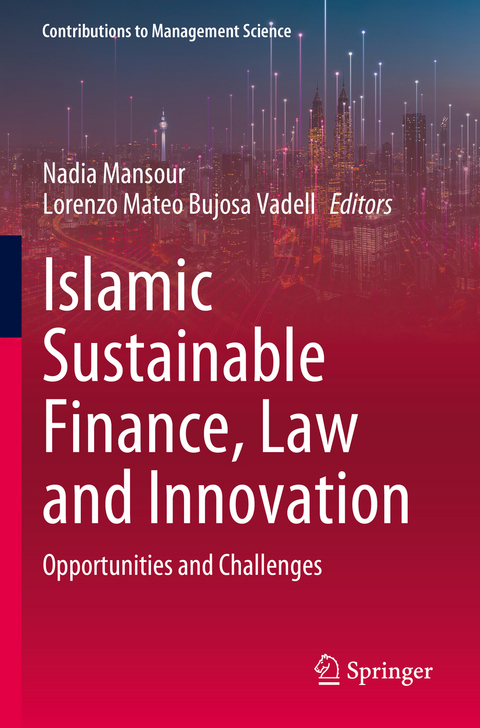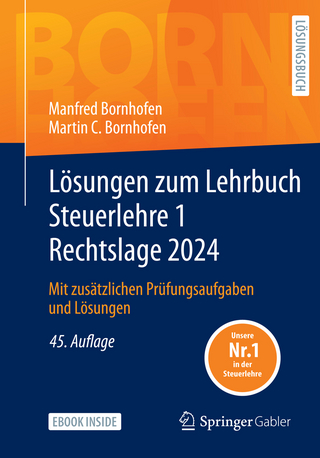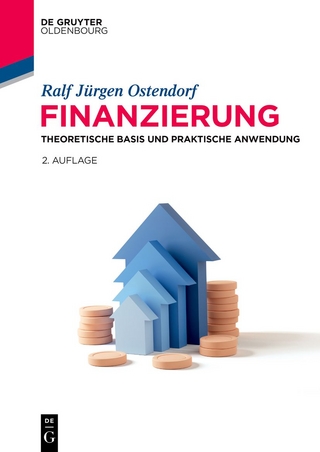
Islamic Sustainable Finance, Law and Innovation
Springer International Publishing (Verlag)
978-3-031-27862-4 (ISBN)
This volume discusses the role and characteristics of Islamic finance and how it can contribute to a sustainable financial system. Islamic finance is not only for the 1.5 billion Muslims. Several countries are interested in it because it has interesting characteristics in terms of transparency and banking regulation. Although the origins of Islamic finance date back several centuries, its resurgence is relatively recent. From its modern beginnings in Egypt and Malaysia, Islamic finance is now a growing sector and its recent performance contrasts with that of conventional banks. Rapid growth and innovation are transforming the sector, driving economic development in an increasing number of jurisdictions, while also increasing the number of new opportunities and challenges. Today, with the problem of climate change and its adverse effects on the whole world, the flexibility of Islamic finance concerning the operations available to those who wish to finance the development of infrastructure, makes this area crucial for sustainable finance.
Dr. Nadia Mansour is an assistant at The University of Sousse- Tunisia, a visiting researcher, and a post-doctor at the University of Salamanca-Spain. She is a member of the IUDICIUM: Grupo de Estudios Procesales de la Universidad de Salamanca. Her research interests focus on Finance, Banking, Sustainable Finance, and Innovation. She is an academic member and ambassador of the Communication Institute of Greece, a committee member of indexed conferences, an editorial board member of Taylor & Francis, IGI GLOBAL, and Springer, a reviewer in IGI Global, Emerald, and Wiley, an associate editor of Journal of Sustainable Finance and Investment. She has presented various scientific papers in international (France, Morocco, USA, Turkey) and national conferences. She is the co-chair of the international conference: Finance, Accounting, and Law in the digital age. She is also a keynote speaker and session chair in several indexed conferences in (Turkey, India, and UAE). She has several published articles in ranked journals and chapters (Emerald, IGI Global, Palgrave Macmillan) as well as edited books (Taylor & Francis, Springer). She is an associate editor for a number of Special Issues at indexed Journals (Taylor & Francis).
Lorenzo Mateo Bujosa Vadell is a professor of procedural law at the university of Salamanca (Spain). He is president of the Ibero-American Institute of Procedural Law, and member of the International Association of Procedural Law and the International Association of Criminal Law. He is the coordinator of the PhD program "Administration, Justice and Finance in the Social State" at the University of Salamanca. He has enjoyed research stays at the Universities of Kansas (USA), Florence (Italy), and Trier (Germany).
Chapter 1. Analysis of Acceptance' Level of Takaful Products in Iran.- Chapter 2. Identifying and Ranking Factors Affecting the Demand for Takaful Insurance in Iran.- Chapter 3. Nafsul Ihtisab Change Agility: A Foundation to Spread the Spirit of Change.- Chapter 4. The Conceptual Framework of Mustahiq Entrepreneurs' Welfare in Productive Zakat Empowerment (Sharia Maqasid Approach).- Chapter 5. Economic Empowerment of Islamic Boarding Schools Through Optimization of Halal Value Chain: A Conceptual Offer.- Chapter 6. Developing Conceptual Framework for Public-private Partnership Projects via Mobilization of Islamic Finance in Indonesia.- Chapter 7. Takaful on Covid-19 Coverage: Case study of Malaysian's General Takaful operators .- Chapter 8. The Impact of Islamic Branding on Customer Loyalty with Customer Satisfaction as an Intervening Variable.- Chapter 9. Role of Islamic Microfinance in Enhancing Financial Inclusion in Bangladesh: A Systematic Literature Review.- Chapter 10. TheApplication of Artificial Intelligence in Metaverse: A New Challenge on Personal Data Protection in the Financial System.- Chapter 11. The Application of Mobile Banking Services by Malaysian Islamic Banks an Evaluation on the Customers' Main Concerns.- Chapter 12. Islamic Equity Financing as a Financial Inclusion Enabler: Nigeria in Spectrum.- Chapter 13. Financial Inclusion in Somalia Between Reality and Expectations.- Chapter 14. Potential of Islamic Microfinance: Issues, Challenges and Way Forward.- Chapter 15. The Role of Financial Behaviour, Financial Stress and Financial Well-being Towards Islamic Financial Literacy.- Chapter 16. An Analysis of the Impact of Islamic Microfinance Among Asnaf.- Chapter 17. Rectifying the Downsides Pension Fund with the Critical Analysis of Triangle Justice Ecosystem: A Comparative Case Study in Indonesia and Malaysia.- Chapter 18. The Effect of Financing Distribution on NPF in Islamic Banking: A Short and Long-term ECM Analysis.- Chapter 19. Intention to Participate in Microtakaful Scheme Among Poor Family: A Case Study on East Java Province.- Chapter 20. The Rahn Practices by the Real Estate Agencies in Afghanistan: The Sharia and Legal Analysis.- Chapter 21. Improving Microtakaful Offering Through Stakeholders' Collaboration: Critical Analysis Using Systematic Literature Review.- Chapter 22. Sukuk's Role in Financing Infrastructural Development During Covid-19 Pandemic in Nigeria.- Chapter 23. Identifying Factors of Financial Exclusion of Rural Farmers: Case Study in Ulu Dong Raub, Pahang.- Chapter 24. Roles of Islamic Financial Literacy on Financial Decision Making: Building a Conceptual Framework Based on Theory of Planned Behavior and Social Cognitive Theory.- Chapter 25. An Evaluation of Cash Waqf Deposit Performance Through Islamic Banks in Bangladesh.- Chapter 26. Takaful Plan for E-hailing: A Comparison Between the Available Private Motor Takaful in Malaysia.- Chapter 27. The Role of Religiosity and Hard Working on Human Resources Performance Baitul Mal Wat Tamwil Ummat Sejahtera Abadi.- Chapter 28. Improving Business Success Through the Use of Accounting Information and Business Capital Management.- Chapter 29. Islamic Communication in Outbound Management Training.- Chapter 30. Addressing Negative Spill-over Effects of Overcrowding in Malaysian Prisons: Can Islamic Financial Institutions Play a Role?.- Chapter 31. Evaluation on the Practice of Ijarah for Vehicle Financing and Its Regulation in Islamic Financial Institutions in Sri Lanka.- Chapter 32. Enhancing Access to Finance Amongst Asnaf Micro Entrepreneurs: How Can Islamic Fintech in Zakat Institutions Play a Role?.- Chapter 33. Optimizing Digitalpreneurship Through Digital Skills and Platform Strategy on MSMEs in Central Java.- Chapter 34. Sharia Investment Decision-making: Gender Lens Investing, Fear of Missing Out, and Islamic Financial Literation.- Chapter 35. How Do Islamic Banks Report and Distribute Zakat in Malaysia?.- Chapter 36. The Role of Libyan Zakat Foundation in the achievement of Social and Economic Development (Zliten Zakat Foundation as a Model) .- Chapter 37. Islamicity and Reporting Performance on Islamic Bank-ing Financial Performance in Indonesia Post-covid-19 (Period: 2019-2021).- Chapter 38. The Effect of Institutional Theory Towards Shariah Audit Practice in Malaysian Takaful Industry.- Chapter 39. Assessment of Financial Performance of RSI Sultan Agung Semarang Through the Maqashid Sharia Con-cordance (MSC) Approach.- Chapter 40. Impact of Electronic Service Quality on Customer Satisfaction of Islamic Banks in Pakistan.- Chapter 41. Maqashid Sharia Framework: Sharia Financial Inclusion Through Indonesian Sharia Mobile Bank.- Chapter 42. Exploration of Sharia Bank Services in Muhammadiyah's Higher Education Students.- Chapter 43. Is the Islamic Religiosity Become the Cashless Behaviour Among Muslim Community?.- Chapter 44. Consumer Awareness of Takaful.- Chapter 45. The Presentation and Disclosureof Islamic Banks' Financial Statements: A Comparative Analysis of IFRS and Aaoifi Financial Accounting Standards.- Chapter 46. Indonesia's South-south Cooperation in Promoting Sharia Economic Development in Sudan.- Chapter 47. The Application of Sanda (Rahn) in the Meranaw Society in the Bangsamoro Autonomous Region in Muslim Mindanao.- Chapter 48. Significance and Potential Role of the Islamic Banking and Finance Services in Bangsamoro Autonomous Region in Muslim Mindanao.- Chapter 49. ESG Practices and Firm Risk: Evidence from Malaysia.- Chapter 50. The Muhammadiyah Waqf Organization: Prospects and Challenges.- Chapter 51. Strategies for Improving Cash Wakf Fundraising Through Optimization of Cash Wakf Literacy in Indonesia.- Chapter 52. Measuring the Customer's Perception of the Use of Financial Technology in Algerian Islamic Banks.- Chapter 53. Current Trends and Sustainable Development of warehouse Logistics.- Chapter 54. Exploring CSFs for Application of Six Sigma Programs -an Empirical Evidence from Small-scale Industries (SSIs).
| Erscheinungsdatum | 28.07.2024 |
|---|---|
| Reihe/Serie | Contributions to Management Science |
| Zusatzinfo | IX, 562 p. 65 illus., 51 illus. in color. |
| Verlagsort | Cham |
| Sprache | englisch |
| Maße | 155 x 235 mm |
| Themenwelt | Recht / Steuern ► Wirtschaftsrecht |
| Wirtschaft ► Betriebswirtschaft / Management ► Finanzierung | |
| Wirtschaft ► Volkswirtschaftslehre ► Mikroökonomie | |
| Schlagworte | behavioural finance • Financial innovation • FinTech • Green finance • Innovation • Islamic Finance • Law • sustainability • Sustainable Finance |
| ISBN-10 | 3-031-27862-3 / 3031278623 |
| ISBN-13 | 978-3-031-27862-4 / 9783031278624 |
| Zustand | Neuware |
| Haben Sie eine Frage zum Produkt? |
aus dem Bereich


